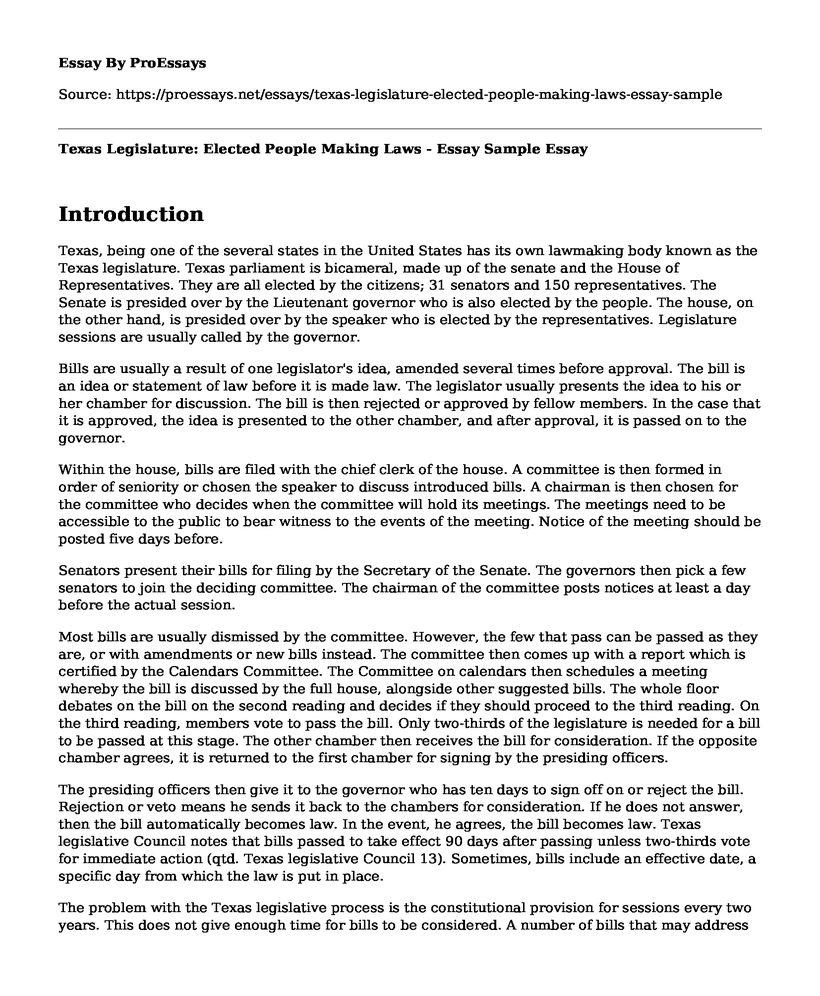Introduction
Texas, being one of the several states in the United States has its own lawmaking body known as the Texas legislature. Texas parliament is bicameral, made up of the senate and the House of Representatives. They are all elected by the citizens; 31 senators and 150 representatives. The Senate is presided over by the Lieutenant governor who is also elected by the people. The house, on the other hand, is presided over by the speaker who is elected by the representatives. Legislature sessions are usually called by the governor.
Bills are usually a result of one legislator's idea, amended several times before approval. The bill is an idea or statement of law before it is made law. The legislator usually presents the idea to his or her chamber for discussion. The bill is then rejected or approved by fellow members. In the case that it is approved, the idea is presented to the other chamber, and after approval, it is passed on to the governor.
Within the house, bills are filed with the chief clerk of the house. A committee is then formed in order of seniority or chosen the speaker to discuss introduced bills. A chairman is then chosen for the committee who decides when the committee will hold its meetings. The meetings need to be accessible to the public to bear witness to the events of the meeting. Notice of the meeting should be posted five days before.
Senators present their bills for filing by the Secretary of the Senate. The governors then pick a few senators to join the deciding committee. The chairman of the committee posts notices at least a day before the actual session.
Most bills are usually dismissed by the committee. However, the few that pass can be passed as they are, or with amendments or new bills instead. The committee then comes up with a report which is certified by the Calendars Committee. The Committee on calendars then schedules a meeting whereby the bill is discussed by the full house, alongside other suggested bills. The whole floor debates on the bill on the second reading and decides if they should proceed to the third reading. On the third reading, members vote to pass the bill. Only two-thirds of the legislature is needed for a bill to be passed at this stage. The other chamber then receives the bill for consideration. If the opposite chamber agrees, it is returned to the first chamber for signing by the presiding officers.
The presiding officers then give it to the governor who has ten days to sign off on or reject the bill. Rejection or veto means he sends it back to the chambers for consideration. If he does not answer, then the bill automatically becomes law. In the event, he agrees, the bill becomes law. Texas legislative Council notes that bills passed to take effect 90 days after passing unless two-thirds vote for immediate action (qtd. Texas legislative Council 13). Sometimes, bills include an effective date, a specific day from which the law is put in place.
The problem with the Texas legislative process is the constitutional provision for sessions every two years. This does not give enough time for bills to be considered. A number of bills that may address the issues of Texan citizens are dismissed because of inadequate debating time. They are simply killed within committees. There is always a hurry to get done with issues so only the most pressing issues. Governor Perry is remembered for calling 12 sessions during his time as governor, the most so far, which still not enough is considering the number of legislative emergencies that Texans have. Debates are often postponed and it takes years for some bills to reach the floor. Some of the improvements that could be made on legislation is to have a constitutional provision for more sessions to force more bills to be considered. The Committee on calendars should be held accountable on all steps of the legislative process from the conception to ensure more ideas are looked into rather than killed because of time. The committee on calendars has so much power yet is rarely held accountable for some of the failures of registration. Also, the sessions are public and public opinion is encouraged yet never really included in the process. At the end of the day, the legislative process becomes a political floor where different parties push their own agendas. Public opinion should make its way into the decision making process.
Works Cited
Texas legislative Council. The Texas Legislative Process. Texas: Texas Legislative Council 2018. Print.
Cite this page
Texas Legislature: Elected People Making Laws - Essay Sample. (2023, Mar 04). Retrieved from https://proessays.net/essays/texas-legislature-elected-people-making-laws-essay-sample
If you are the original author of this essay and no longer wish to have it published on the ProEssays website, please click below to request its removal:
- Examples of Human Rights Violations Around the World
- Celebrities Entitlement to Private Life Essay
- Immigration and Tolerance Essay
- Research Paper on Biological Evidences and Serology
- Essay Example on Correctional System: Management, Handling & Psychology
- Essay Example on Two Revolutionary Lives: Martin & Malcolm Fight for Equality
- Free Report Example: Evaluating Long-Term Effects of Prisoner Re-Entry Services on Recidivism







